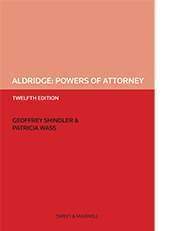Description
- Explains the different types of powers of attorney and their scope, looks at the capacity of the donor and the attorney, and considers the contents, form, and duration of the power and its exercise
- Examines the duties of both the donor and the attorney, and the protection of the attorney, as well as the position of third parties dealing with an attorney, and of a trustee exercising a statutory power to delegate their functions
- Deals with lasting powers of attorney and enduring powers of attorney (the latter can no longer be granted, but those validly granted before 1 October 2007 remain effective)
- Discusses the Government’s proposals for changes to the process for making and registering a lasting power of attorney to enable a digitally produced document
- Looks at the use of powers of attorney in particular situations, including land, grants of representation and companies
- Advises on drafting issues
- Includes forms and precedents for powers of attorney and ancillary documents
- Reproduces relevant primary and secondary legislation for ease of reference
- Is updated throughout to reflect recent developments in legislation and case law
CONTENTS
Introduction
Scope of Power
Donor
Attorney
Contents of Power
Form of Power
Duration of Power
Exercising a Power
Duties of Donor
Duties of Attorney
Protection of Attorney
Position of Third Parties
Trustees
Registering Lasting Powers of Attorney
Practical Points on the Use of Lasting Powers of Attorney
Enduring Powers of Attorney
Filed Powers
Land
Grants of Representation
Companies
Appendix 1. Relevant Acts
Appendix 2. Relevant Statutory Instruments
Appendix 3. Forms of Document
Appendix 4. Clauses for Ordinary Powers of Attorney
Appendix 5. Lasting Powers of Attorney
Appendix 6. Enduring Powers of Attorney
Appendix 7. Public Guardian Practice Note


Reviews
There are no reviews yet.